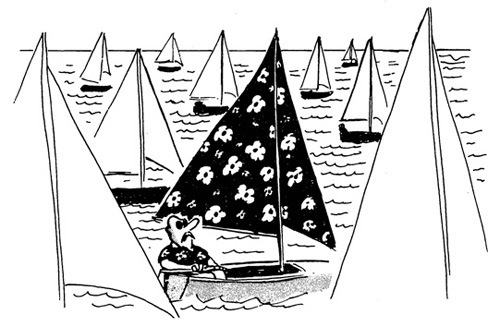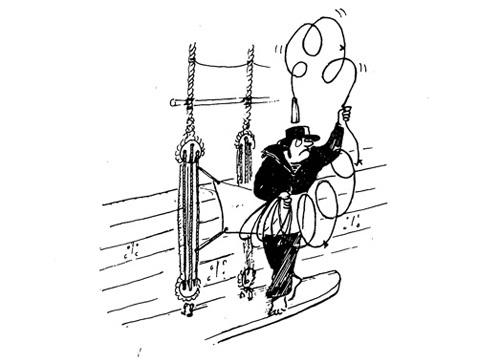Salty Dog Talk (10 page)
Authors: Bill Beavis

The following is an extract from the Captain’s Journal of a brig sailing off the Spanish coast in 1835:
This day the surgeon informed me that a woman on board had been labouring in child for 12 hours and asked if I could fire a broadside to leeward. I did so and she was delivered a fine male child.
In cases where the paternity was uncertain, the child was entered in the Deck Log as
son of a gun
.
The international radio signal for distress. The letters were chosen because their morse code characteristics were distinctive, easy to remember and make. The mnemonic ‘save our souls’ was originally ‘save our ship’ and the first time the signal was made at sea was in 1908 from the American ship
Azaoahe
. Years later a new international distress signal was born at sea. This time the spoken word MAYDAY from the French
m’aidez!
help me.
Researchers
sound out
public opinion, which means search and enquire, in exactly the same way as the sailor does when he
sounds
the depth of water beneath his ship with an echo-sounder or sounding line. From the Anglo-Saxon
sund
– messenger.
It is an abbreviation for south-westerly wind which around the shores of Northern Europe is the one which brings the rain. Hence it became the sailor’s name for his oilskin cap and now more generally, a wide-brimmed waterproof hat which fastens under the chin.
In pristine condition; it referred originally to a newly built ship. A
spic
was a spike or nail, a
span
a length of timber, both primary items of ship construction.
It has the ring of a salty expression and is popularly thought to have come from wet weather days when crews would be given the job of ‘spinning’ or loosely twisting together yarns of old rope to be used for small tying jobs. Sheltering under the foc’sle head it would have been a great time for telling stories. However, spinning yarn was carried on ashore long before it was at sea and this is probably one of the few shore expressions adopted by seamen.
To spin a fibre, especially wool, correctly and ensure it remains the right size, length and twist, the spinner has to continually stretch the material. Thus when the old-timers wanted to suggest that someone was stretching the truth they likened it to ‘spinning a yarn’.

Spic and span
An extra tot of rum. There is a cynicism in this expression. The worn part of a rope would sometimes be cut out and the ends long-spliced together. It provided a reasonable repair, the rope looked as good as new although not quite so strong as before. The main brace however, was such an important rope that splicing was not often considered and at the first sign of damage or wear the rope was renewed. The expression implies that an extra tot of rum was as rare as a splicing of the main brace.
This is a misquotation. Correctly it is ‘spoil the
sheep
for a ha’p’orth of tar’ and refers to the practice of applying bitumen or tar to a sheep’s feet to prevent it contracting disease.
From the custom of ships in harbour ‘squaring’ their yards horizontally to the deck and at right angles to the fore and aft line. The phrase has come to mean to repay debts; to square with somebody; the state of being normal and correct.
A ship will stand in towards the land, stand off a port, stand in with another vessel when sailing together, and stands by in case of trouble. The word has come ashore, people also stand-by, stand their ground, stand in favour, become stand-offish, or simply like to know how they stand?
From the old French
estanche
meaning watertight. A vessel which had no leaks was described as staunch. Hence firm, reliable.
To stave, the operation of breaking the planks of a boat, past tense of the verb is stove. To stave off meant to thrust a boat from the stone quay or ship’s side with a boathook or spar to prevent her from being damaged. Thus comes the idea of staving off a problem.
An insulting term, and a form of chemical warfare used in Greek and Roman times and again by pirate ships in the 18th century. Earthernware pots filled with sulphur and a slow-burning fuse were lit and thrown onto the oponents’ deck. Once ignited the mixture produced an intolerable stench and clouds of black smoke. This created a diversion as the attacker closed alongside and armed men prepared to board.
The shortened form of ‘strike work’. It was a method of protest against low wages, poor conditions, etc. The crew would
strike
or lower the ship’s yards to immobilise her. It was particularly done in port and not at sea which would have been mutiny.
The phrase ‘Old suck the monkey’ is an insult which has attracted several variations (He doesn’t give a monkey’s, etc.) It comes from the practice common amongst British seamen serving in the West Indies during the American War of Independence of persuading the local women to bring coconuts aboard filled with rum which was then drunk or sucked from the small holes. There are two explanations for the word ‘monkey’, it was the word for the small wooden casks which were also employed for this purpose plus the obvious association that the hairy coconut looked like a monkey’s face.
Time for a drink. The expression began with passengers on North Atlantic liners steeling themselves to wait for an alcoholic drink until the moment the sun had risen above the foreyard; in these latitudes that would have been around midday. There is no suitable explanation, however, for the other well known nautical toast
down the hatch
. It first appeared in print in the 1930s in a book by P. G. Wodehouse. He might even be the inventor, it sounds like him.
The most unfortunate girl in history. Not enough that she was brutally murdered and dismembered (by a deranged accountant) but her initials have become anagrammed into an ugly expletive. It was a historic coincidence that her separate parts should turn up in a trunk at the Deptford Navy Yard just at the time that the navy was switching to tinned meat. No prizes for guessing what the meat was subsequently called.
However, time has sweetened the injury and compassion, even utility has crept in. Instead of the meat it was the large square containers which were to finally immortalise her name. They were called
fannies
and were popular with sailors who used them as receptacles for collecting food from the galley. (Even today’s stainless steel replacements are called ‘fannies’.) The suggestion of being dispossessed, which the expression means today, comes from the idea of a completed meal and the fanny being empty. The ‘sweet’ followed later, with atonement.
Before instruments were introduced, the usual method of ascertaining the depth of water was a long length of line weighted with a lump of lead. It was called the ‘hand lead line’, or more simply ‘the lead’. A sailor would climb over the ship’s rail, secure himself to the chain plates and make a continuous number of ‘casts’. This entailed swinging the lead over his head several times then letting it fly ahead. It was necessary to twirl the line and shoot it ahead so that by the time the lead had sunk to the bottom the ship’s headway would have brought the line perpendicular and the correct depth could be seen. Less competent leadsmen would make a great display of twirling the lead around their heads to mask their inability to read the depth correctly. In other words they were faking it, merely pretending to work.

Swinging the lead
Another explanation is that soldiers, travelling in troopships and watching the leadsman, considered it such effortless work they borrowed the term for laziness.
Take Down a Peg
It is believed to date from the 17th century when flags began to play an important part in indicating command or rank. Admirals already had their own flag (hence the term flag officer) but from this time it became the general practice for an Admiral of the Fleet to fly a Union flag on the main, or highest mast, and lesser admirals to fly their flags from the foremast or the mizzen. Flag halyards were secured to pegs, and if a senior admiral handed over his command to a junior then the flag would have to be flown in a subordinate position, or taken down a peg. Thus the phrase has come to mean to blunt somebody’s pride.
A ship is said to be
taken aback
when through a dramatic shift in the wind or careless steering her sails suddenly billow out in reverse. The helmsman is then taken aback in more senses than one.
When Hans Andersen published his enormously successful
Hansel and Gretel
, the gilded scrollwork which had decorated sailing ships since mediaeval times suddenly found a name! It was called
gingerbread
after the ornate and over-embellished witch’s cottage. However, the name had come too late and
gingerbread
, which had once blossomed high over the sterns and quarters of all the great warships, was in decline. Labour costs had risen so that it was now more expensive to decorate the ship then equip her with cannon. The Admiralty severely restricted its use. It spoilt the attraction, or as the saying puts it ‘took the gilt off the gingerbread’.
A sailing ship passing to windward of another will blanket the wind blowing on its sails thus causing her to slow or even stop. It was a tactic used in warfare, later by pirate ships and is very common in yacht racing today.
List of duties to be paid on imports and exports, lists of prices and charges. From the Spanish sea port of Tari’fa about twenty miles from Gibraltar from where the Moors levied contributions according to a certain scale on vessels entering the Mediterranean.
The skin decoration produced by the injection of coloured pigments, was introduced to the western world by Captain Cook who described it in his journal after a visit to Tahiti in 1764. He also brought back Robert Stainsby, a seaman from the
Endeavour
who had allowed the natives to tattoo his body. From the Tahitian word and meaning to prick.
The diarist and secretary to the Royal Navy, Samuel Pepys, while relating to King Charles II in 1664 some of the stories told to him by the captain of
HMS Defyance
, mentioned the existence of flying fish. The courtiers present refused to believe this, but an officer of the Maritime Regiment of Foot, Sir William Kellegrew who was present, insisted that it was true for he had also seen them. The king is then reported to have said ‘From the nature of their calling no class of our subjects can have so wide a knowledge of seas and lands as the Officers and Men of our Loyal Maritime Regiment. Henceforth ere we cast doubts upon a take that lacks likelihood we will first
Tell it to the Marines
!’ The expression took on a cynical meaning when explained to the seamen of the lower deck, and ever since it has been used as a statement of disbelief .
It proved very useful to newspaperman Malcolm Muggeridge who remembered using it to fool a Kremlin censor. Obliged to report accurately the announcement that Russia was spending just 2% of her budget on defence he added the comment ‘suggest you inform marines’. Incidentally, marines are called
leathernecks
because of their uniform caps which once had a leather tongue to protect the back of the neck.

